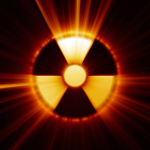Drug might offer hope to radiation and cancer victims
by
Brendon Nafziger, DOTmed News Associate Editor | June 25, 2010

Novel research into
treatment for radiation poisoning
An easily stockpiled drug that freezes cells in their life-cycle could aid victims in the wake of a nuclear power plant accident or detonation of a radiological bomb, as well as ease the brutal side effects of cancer treatment, researchers said this week.
The drug is part of an emerging group of chemicals investigated, thanks in part to government money, as a "radiomitigant," which would mitigate the effects of radiation exposure and prevent deaths from acute radiation syndrome. Currently, no such drugs are on the market, scientists say.
In research reported in the Journal of Clinical Investigation, a class of agents used in experimental cancer research was found to preserve the bone marrow from injury in mice after exposure to normally lethal blasts of whole-body ionizing radiation.
Critically, the drug worked even if delivered up to 20 hours after radiation exposure, important for use in a real-life disaster when emergency teams might not be able to reach victims immediately.
PROTECTING BONE MARROW
One of the main causes of death after full-body irradiation is hematopoietic syndrome, where the victim dies from lack of blood, as so much bone marrow is destroyed it can't replenish the blood supply. The drug, by preventing bone marrow cells temporarily from dividing, is able to keep more of the cells alive thereby protecting the animal, the researchers said.
"For the L[ethal] D[dose] 90, when you kill 90 percent of the animals with radiation, we protect 100 percent in that range," lead author Dr. Norman Sharpless told DOTmed News.
INSPIRED BY SCI-FI
The idea for a drug to protect against radiation poisoning came to Sharpless, associate director for translational research at University of North Carolina's Lineberger Comprehensive Cancer Center in Chapel Hill, as he was watching the first season of Battlestar Galactica, he said.
"This guy needs this radiation resistance medicine, and he's running around, hiding from the bad robots," Sharpless said.
"I was sort of like, 'How would that work? How could one make a person radioresistant?'"
An oncologist, Sharpless had studied the cell cycle for most of his research career. It has been known for at least 50 years, he said, that cells dividing are more sensitive to DNA damage. This is partly why the highly proliferative cells like those in the gut and bone marrow are the most impacted by ionizing radiation and even chemotherapy agents, both of which can cause devastating double-strand DNA breaks.
Sharpless said researchers believe that cells in the non-dividing state, technically called the G1 phase, are better able to repair DNA damage. Also, there seems to be a checkpoint the cells pass through as they transition to the dividing phase, and those with DNA damage perish, likely as a precaution to prevent dangerous mutations.
